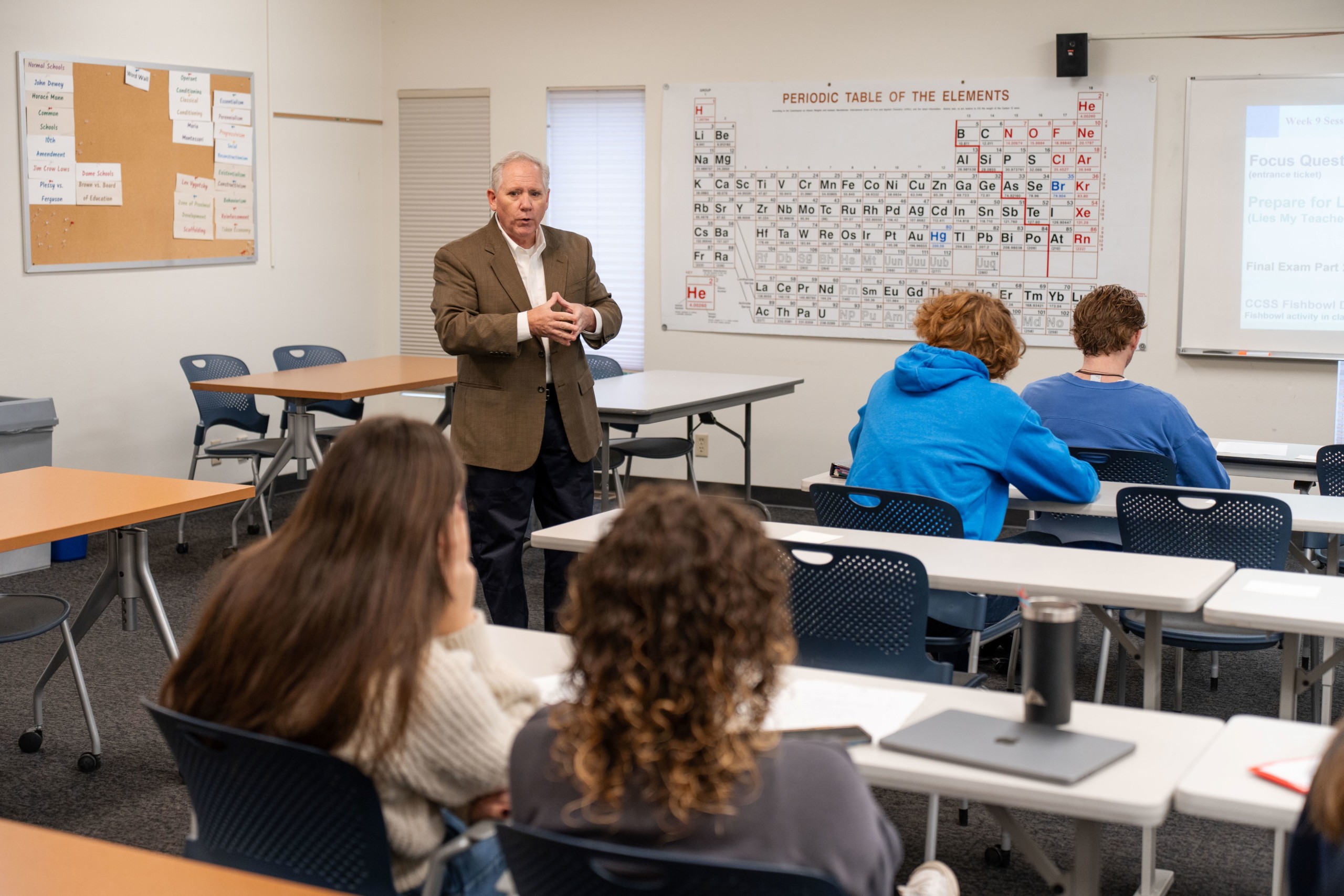
For Dr. Brian Kaelin, stepping onto Bushnell University’s campus for the first time was more than a visit: it was a calling.
“The very first time that I stepped onto the campus, I thought to myself, ‘This is a place I’d love to teach,’” he recalled. “It was literally the moment we arrived — meeting people, seeing the place — I just knew this is where I’d want to be.”
Kaelin describes his journey to Bushnell as nothing short of divine. “When people ask what brought me here, I feel like it was God,” he said. “I was called here.”
Kaelin holds a doctorate in education from George Fox University and a master’s in education with a focus on instructional technology from San José State University. Before joining Bushnell University in 2020, he spent seventeen years teaching secondary education, primarily in language arts and a variety of elective courses. He has also served as a mentor teacher and instructional technology coordinator, bringing practical strategies to engage learners and integrating emerging technologies across K-12 classrooms. Kaelin’s research interests include interdisciplinary, project-based learning environments and pre-service teacher-identity development.
Now a full professor in Bushnell’s School of Education, Kaelin teaches a wide range of courses across both undergraduate and graduate programs, including Classroom Relations and Management, Adolescent Development, Technology for Teaching and Learning, Foundations of Education, and Secondary Language Arts Methods. He also serves as the program advisor for the Master of Education program and was honored as Bushnell’s Faculty of the Year in 2009–2010.
We sat down with Kaelin to learn more about his journey to Bushnell, his philosophy of guiding students to discover their calling, and how he integrates faith, service, and mentorship in the classroom. You can watch the full interview on Bushnell’s YouTube channel or via the embedded video below.
Teaching with Purpose
Dr. Kaelin’s teaching philosophy centers on mentorship, guidance, and discovery. Rather than standing in front of the class as the sole source of knowledge, he sees himself as a “guide on the side.”
“I think of myself like a Sherpa leading students up the mountain,” he said. “I’m not doing all the heavy lifting — I’m helping facilitate the learning that’s already happening there.” What drives him most is the belief that every student has a calling. “Everybody has something they’re being called to do,” he shares. “My job is to help them figure that out.”
For Kaelin, the integration of faith and learning isn’t complicated — it’s natural. “We naturally reflect the things that are in our heart and in our lives,” he explains. “As a person of faith, my faith is going to be manifest in how I engage with people. It’s just naturally there.”
That same approach extends into teaching itself, which he views as a form of ministry and service. “Teaching is a life of sacrifice and a life of service,” he shares. “You’re not going into it to make a lot of money, but you are hopefully going to impact people in a positive way. It’s about asking, ‘What kind of difference can I make in the world?’”
He encourages his students to see education as both vocation and calling. “Faith is woven into the fabric of eveything we do, in the classroom, in the field, in our relationships.” Kaelin continues, “If you have a personal faith, it will naturally manifest itself throughout your life.”
Advice for Students
When asked what advice he would give to Bushnell students, Kaelin didn’t hesitate: “Fully engage. Find every opportunity. Go to everything. Do everything. It’s a limited amount of time. Be present, ask good questions, and take it all in.”
For Kaelin, teaching at Bushnell is more than a profession — it’s a purpose. “I don’t have it all figured out,” he reflects. “I just know there are different pathways to finding your calling. Maybe this is one of them. So let’s go explore it together.”
Visit our website to learn more about Bushnell University’s School of Education, where students are prepared to become purposeful, principled, and proficient teachers and school counselors. Through hands-on practicums, internships, and coursework guided by experienced faculty, students gain the skills and experience needed to make a meaningful impact in classrooms and communities while developing lifelong problem-solving and leadership abilities.